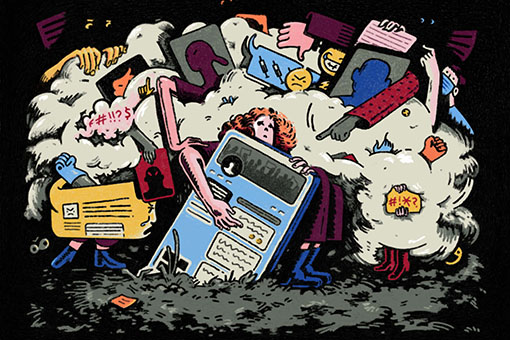"I did my own research."
This article, originally from the New York Times (SMH), is incredible:

The social media profiles of anti-vaccine victims of the pandemic
have made them and their families targets of trolling, even after their deaths.
CREDIT:
SUSAN FARQUHAR/THE NEW YORK TIMES
They died from COVID
Then the online attacks started
New York: Before he died of COVID-19 in September, Nick Bledsoe was not shy about publicly sharing his opposition to masks and vaccines on Facebook.
In April, Bledsoe, an auto mechanic from Opelika, Alabama, added a frame declaring “I don’t care if you’ve had your vaccine” to his profile photo and urged his father not to get the shot.
During the American summer, he posted a petition against school mask requirements, cursed President Joe “Biden and his vaccine” and in his final post, shared a video casting doubt on the safety of vaccination against the coronavirus.
Then, with his last words before being placed on a ventilator, Bledsoe agreed to get vaccinated once he recuperated, according to his father. But he never left the hospital, dying at the age of 41 and leaving behind a wife and four children.
The day after Bledsoe died, his father started urging those who were unvaccinated to get the shots.
The details of Bledsoe’s death and desperation-fuelled change of heart stayed largely confined to his Facebook page. That is, until they appeared in screenshots the following week on a website that compiles the coronavirus deaths of vocal vaccine opponents.
Almost immediately, strangers began barraging the dead man’s Facebook page with insults and mockery.
“They were making comments that he should have died, that he deserved to die,” said his father, Hal Bledsoe. “It hurt.”
Tapping into the outrage are Reddit forums where there are entries focused on “suicide by COVID”.
Brytney Cobia recently posted on Facebook the following account of her experiences working as a doctor in Birmingham, Alabama, USA:
“I’m admitting young, otherwise healthy people to the hospital with very serious COVID infections. One of the last things they do before they’re intubated is beg me for the vaccine. I hold their hand and tell them that I’m sorry, but it’s too late.
"A few days later when I call time of death, I hug their family members and I tell them the best way to honour their loved one is to go get vaccinated and encourage everyone they know to do the same.
“They cry. And they tell me they didn’t know. They thought it was a hoax. They thought it was political. They thought it was ‘just the flu’. But they were wrong. And they wish they could go back. But they can’t.”
From Peter Singer's article in the SMH:
Why vaccination should be compulsory
We should expect to see a renewed push of disinformation and vocal resistance from the anti-vaccination movement.
Over the past year, seemingly endless conspiracy theories and misinformation campaigns have gained traction online amidst rising COVID-19 infection rates worldwide.
Looking at the history of these movements can help us understand why they can be so effective at capturing a popular following.
As a historian of medicine, it’s become clear from researching the history of vaccines that those who promote anti-vaccination consistently use a standard set of strategies.
Although it can be hard to see patterns of argument in the modern context, looking back at a historical instance of epidemic and misinformation provides a useful case study for revealing today’s recurring anti-vaccination strategies.
One popular pamphlet published in 1885 during the smallpox epidemic in Montréal is a great example.
Over a century later, we have the benefit of living in a world that has eradicated smallpox using a vaccine.
Yet in the past, smallpox vaccination was hotly contested, despite the evidence in favour of its effectiveness.